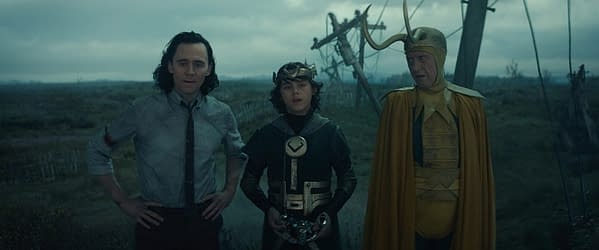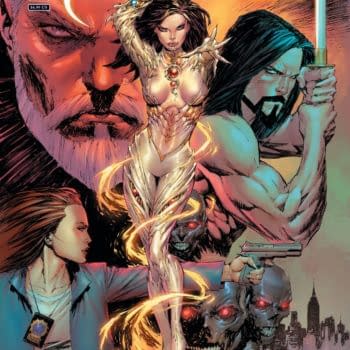Posted in: Disney+, Marvel, Opinion, TV, TV | Tagged: disney, loki, Marvel Studios, opinion, tom hiddleston
Loki & Psychotherapy: An Allegory for Self-Healing and Redemption
This week's episode of Loki proves once and for all the show is ultimately an allegory for therapy and self-healing. Loki (Tom Hiddleson) is the patient. The entire series is his psychotherapy session. The trickster god is confronted with literally several different versions of himself, all the same as him yet different. He discovers his variants are all stuck in a rut from sticking to what's expected of him, to be a heel, a betrayer who always fails in his schemes, who always messes up. He even meets a smarmy, self-serving power-hungry version of himself whose scheme comes undone right at the moment of triumph, and that's typical of any Loki's schemes.

Kid Loki is the most even-keeled variant who represents his child-like side. Even Alligator Loki fits as another aspect of Loki: his reptilian, animalistic side in Jungian terms. Each and every Loki variant is a symbol for a different aspect of his personality, all trying to reconcile with each other so that Loki can become a fully integrated and functional person, which is the ultimate goal of psychotherapy.
So what happens if you bring together several Lokis who are willing to change for the better? It becomes about self-honesty, self-healing to arrive at self-love, and self-acceptance. it also reinforces the MCU's main ongoing theme of redemption and self-sacrifice for the greater good. Any Loki who discovers that their Glorious Purpose is to sacrifice oneself for others is the end of Loki's arc. Old Loki is a master at surviving, but in observing his younger selves, decides that merely surviving and existing is not enough. He admits he became lonely, missing his family and his brother. Giving one's life selflessly is the ultimate reward and fulfillment.
He chooses the sacrifice himself so that they can succeed. Self-sacrifice for the greater good is the Glorious Purpose after all. That's the overriding theme the MCU has always stuck to. It's not for nothing that Loki admits that Sylvie (Sophia di Martino), his female variant is the only one he trusts. His treatment of her is increasingly unguarded and unself-conscious in its tenderness. She is his feminine side and he's learning to accept it. Their love story is an allegory for self-acceptance and self-love because they're ultimately two sides – male and female – of the same person. Loki can also embrace Mobius (Owen Wilson) in sincere friendship. For all the meta-commentary and slapstick comedy, it's a surprisingly emotional and poignant episode.
By the end of this episode, Loki is very different from even the one who died sacrificing himself to save Thor in Infinity War. The finale episode might pay off the plot, but this penultimate episode is the series' real peak – Loki has achieved self-awareness and learned to love himself by loving Sylvie, who is really his feminine side and is rewarded by companionship and greater powers. Whatever way the final episode wraps up the plot, the series and its main character have already found their climax here. Loki has achieved self-knowledge at last and has been rewarded for it. He is no longer alone or lonely. Sylvie might be a major player in the MCU in the foreseeable future – if they don't kill her off to teach Loki one final lesson in his therapeutic journey. Or she betrays him because that's what Lokis do. How he reacts to that will indicate how much he's changed.

Bleeding Cool TV on Instagram: For all of the stuff too random and bizarre to make the site, make sure to follow us on Instagram (with an official launch on June 19): Bleeding Cool TV (@bleedingcooltv).
BCTV Daily Dispatch: For a look at what's going on across the television and streaming landscape, sign up for Bleeding Cool's daily email round-up of the news you need to know here.














